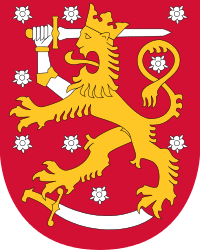City rivalry in Finland
In Finland, there is a kind of tradition of good-natured rivalry between different cities, most notably between Helsinki (the most populous city), Tampere (the third most populous city) and Turku (the fifth most populous city). The inhabitants of any two of these cities can be said to have rivalry between them, because of different reasons.
Overview
Inhabitants of Helsinki are well aware that their city is by far the most populous and most famous in Finland. This can make them seem arrogant and contemptuous to people in other cities, especially Tampere and Turku. Some people in Helsinki refer to Kehä III, the outermost of the two ring roads surrounding the Greater Helsinki area, as a "wolf border" (susiraja), outside which there is no civilisation. Outsiders refer to inside of Kehä III as the biggest psychiatric hospital in Finland.
Those from Helsinki view people from Turku either as naïve and simple-minded, or arrogant and impudent. In Helsinki they have a saying that the only good thing in Turku is the highway leading to Helsinki. Another version is a joke: What is the best place in Turku? - Turku Railway Station. You can catch a Pendolino to Helsinki there. It is also said, that on that same highway, the only place where you can do an U-turn is at the "Turku" sign. Inhabitants of Turku see Helsinkians as presumptuous and parvenu.
Rivalry between Helsinki and Tampere mainly concerns ice hockey. Both cities have two famous ice hockey teams - HIFK and Jokerit in Helsinki, Ilves and Tappara in Tampere. Ice hockey fans in each city say that the teams in the other city are worthless. Also football is important, HJK Helsinki, the most successful club in Finland, is hated especially in smaller cities but also in Turku and Tampere. Probably the most notable inter-city rivalry in football is the fixture between HJK Helsinki and FC Lahti. The matches between the two clubs are highly anticipated and held in great importance between the supporters of both of the clubs. In addition to that, Turku-Tampere rivalry is evident with Turun Palloseura or Inter Turku against Ilves or Tampere United.
Finally, Turku and Tampere also share a rivalry. Turku is far older and has had a greater impact on history and Finnish culture, whereas Tampere is more populous and has a greater significance as an industrial city, lately also in the Information Technology business. Inhabitants in both Turku and Tampere view the people in the other city as uncivilised. A popular joke in Turku asks why children in Tampere have a flat nose. The answer is that there is a Turku midwife working in a Tampere hospital. After delivering a child, the midwife holds him/her to the glass of a window and says: "Look now, child. That way is Turku, there is civilisation." Since 1997, students at Tampere have made annual excursions to Turku to jump on the market square, doing their part to undo the post-glacial rebound and push the city back under the sea.[1] Students from Tampere also go to the border of Turku and hammer wooden nails to the ground, in order to make the city drift off the mainland someday. According to some sources, after learning about these actions a group of Turku inhabitants tried to do the same in Tampere, which naturally amused the locals.
Still, one of the most famous rivalries in Finland is between the cities of Pori and Rauma in the Satakunta Region (Western Province). One of the things that make the difference is the language, which is very different although they're only 50 km apart. Rauma has its own dialect while Pori has a very different kind of lingo. Especially in ice hockey there is a huge rivalry: Pori has three-times champion Ässät and Rauma, one-time champion Lukko. Local derbies tend to be very hectic. Inhabitants also like to make very humiliating jokes about each other.
